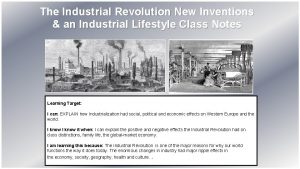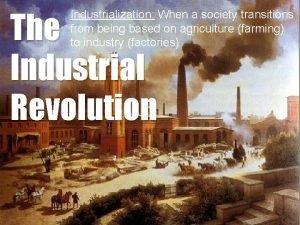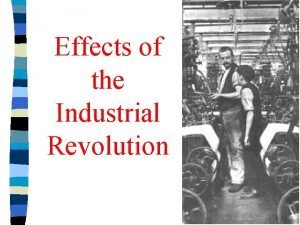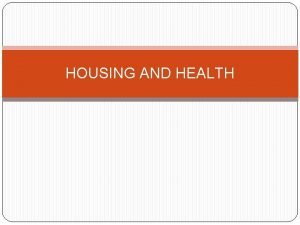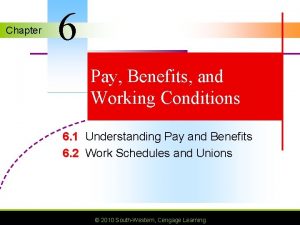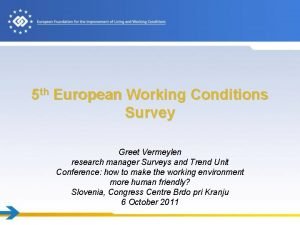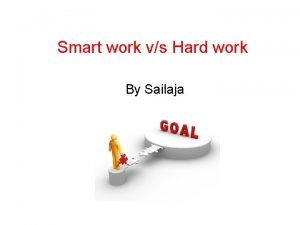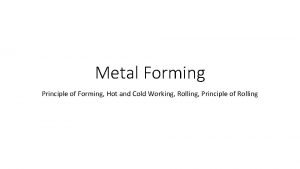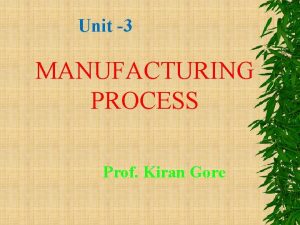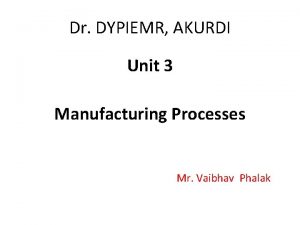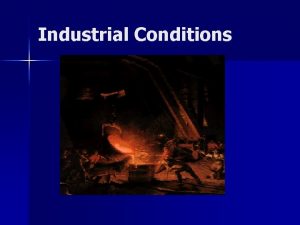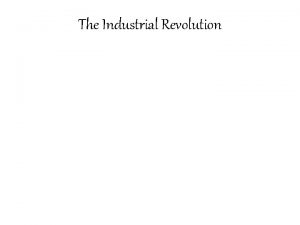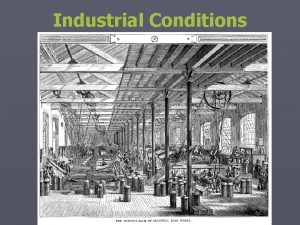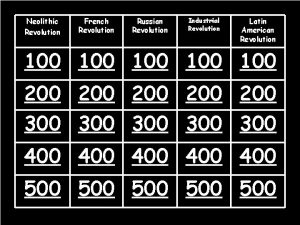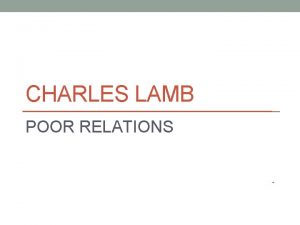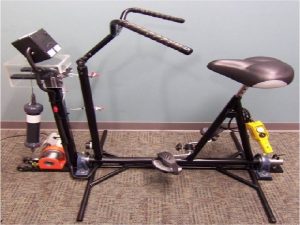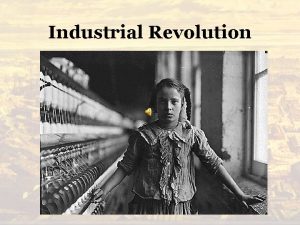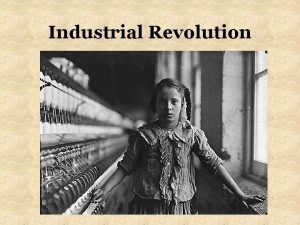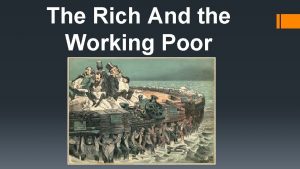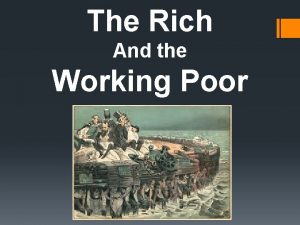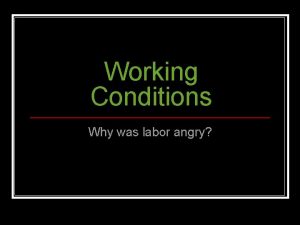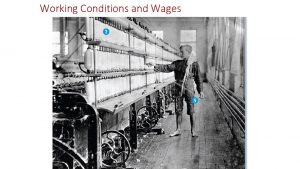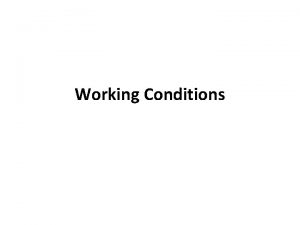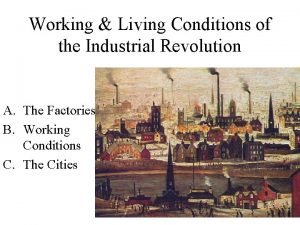Effects of the Industrial Revolution Poor Working Conditions













![Responses to the Industrial Revolution • Workers formed labor unions: organization [created] to protect Responses to the Industrial Revolution • Workers formed labor unions: organization [created] to protect](https://slidetodoc.com/presentation_image_h2/fe6a0eb4b2cea967bc54c3ce097b9a23/image-14.jpg)





- Slides: 19

Effects of the Industrial Revolution

Poor Working Conditions. • Working was often extremely hazardous. • There were few safeguards around machinery. • Thousands of workers were injured/killed in accidents each year. Deformed -Health issues from soot & smoke; diseases: black lung, cancer -Children beaten, fall asleep due exhaustion Boring, Repetitive Tasks. • As industrialists sought to achieve greater speed & efficiency, the worker became nothing more than a human machine. • Work became less skilled, more repetitive monotonous and boring. Low Wages. • Employers hired the cheapest possible laborers. • Women and children were especially low-paid. • Child laborers as young as 6: missed sunshine, fresh air, play and the chance to better their lives through schooling. Long Hours. • Working hours were very long. • Employees faced a six-day week with between 10 and 14 hours of work a day. http: //www. youtube. com/watch? v=C Re. DRHDYhk 8 (tedious work) PROBLEMS FACED BY INDUSTRIAL WORKERS Lack of Security. • The worker could be fired at any time for any reason. • There was no unemployment insurance, health insurance, old-age pensions, paid holidays or paid sick days.

Urbanization – the change from rural countryside to dense cities • Small villages became towns and then cities • Cities grew & had a high population density: the working class was packed into slum areas of towns; cellars used as dwellings • Poor sewage or sanitation system: unpaved streets, riddled with holes; garbage thrown in street to rot, no gutters or drains, sewage flowed into rivers & canals, no ventilation • Cleanliness was difficult; water sources tainted with waste or dyes • Crowded conditions meant disease spread

Urbanization

Changes to Society due to the Industrial Rev • Men emerged as the primary wage earner • Women were denied good jobs & good wages in urban economy and expected to focus on the home & child rearing • Married women rarely were employed; only poorest classes; competed with younger single women; low pay dead end jobs; unable to support an independent living. • Could not pace their work when pregnant, watch children or breast feed while in factories • Increased illegitimate births; increased need for orphanages • Increased alcoholism

Effects of Industrial Rev on the Economy • • • Cotton trade tripled; Iron manufacturing doubled Wages for spinners/weavers increased at first • Steam engines increased demand for fuel (coal), increased employment & led to construction of canals & RR • Goods were cheaper, transportation was faster & foreign good increased • Heads of families died early; increased widows & orphans

Reasons for Child Labor 1. Paid Less Money $ 2. Easier to Control 3. Can Fit into Smaller Places 4. Poverty meant whole families worked in factories: their work was bound to adults; worked as family units; parents lost jobs if they spoke against abuse




http: //www. youtube. com/watch? v=r DN 3 X-WORI 4

Big Business • Laissez-faire policies & profits motivated investors • Corporations – many investors own shares called stocks. (RRs, cars, steel, energy, telegraph and telephone) • As industries grew, some businesses wanted to eliminate competition. • Monopoly – A company or group of companies that has complete control over a particular field of business. –Why are monopolies bad for

Responses to the Industrial Revolution • Luddite movement: British weavers and textile workers who broke into factories and smashed textile machines. (Today someone who dislikes new technology. )
![Responses to the Industrial Revolution Workers formed labor unions organization created to protect Responses to the Industrial Revolution • Workers formed labor unions: organization [created] to protect](https://slidetodoc.com/presentation_image_h2/fe6a0eb4b2cea967bc54c3ce097b9a23/image-14.jpg)
Responses to the Industrial Revolution • Workers formed labor unions: organization [created] to protect the workers. Ex. Amalgamated Society of Engineers – Workers were beaten, worked long hours, in poor conditions, for little pay. – Collective Bargaining: negotiations between an employer and trade union. (TGIF)

Passed by Parliament in 1799, it outlawed unions & stikes and repealed in 1824

Responses to Conditions in Factories • Saddler Report: hearings & testimony from workers & employers on the conditions. • Parliament Legislation – Factory Act of 1833: Limited the working day for children. – B/w ages 9 and 13 boys and girls could not work longer than 8 hour days. – For children age 14 to 18, the limit was 12 hour days. • 1842 Mines Act: Made it illegal to hire women to work in mines. Made 13 minimum age to hire boys. • –New Ideologies formed: • Socialism/Marxism/Communism

Effects of the Industrial Revolution

Effects of the Industrial Revolution • Positive Effects • Negative Effects – New technology (steam engine, cotton gin, etc. ) – Cheaper prices- people can buy more stuff! – Rise of the middle class – Urbanization- growth of cities and large towns (good and bad!) – Improved transportation – Labor Unions to protect people’s rights – Imperialism- taking over of new territory for more raw materials (good for mother country, bad for colony) – Poor working conditions in factories – Rise of child labor – Increase in urban poverty – Slums • New Economic and Political ideologies emerge (Socialism, Communism, and Capitalism)

https: //www. youtube. com/wat ch? v=Pc. Zg 51 Il 9 no
 Capitalism def
Capitalism def Negative effects of industrial revolution
Negative effects of industrial revolution The effects of the industrial revolution meme
The effects of the industrial revolution meme Long term impacts of the industrial revolution
Long term impacts of the industrial revolution Negative effects of the industrial revolution
Negative effects of the industrial revolution Negative effects of the industrial revolution
Negative effects of the industrial revolution Positive effects of the industrial revolution
Positive effects of the industrial revolution Criteria for overcrowding
Criteria for overcrowding Effects of poor typing technique
Effects of poor typing technique Job description computer programmer
Job description computer programmer Kondisi kerja adalah
Kondisi kerja adalah Living and working conditions in australia 1900
Living and working conditions in australia 1900 Fair working conditions
Fair working conditions European working conditions survey 2020
European working conditions survey 2020 Chapter 6 pay benefits and working conditions
Chapter 6 pay benefits and working conditions European working conditions survey
European working conditions survey Hard work and smart work
Hard work and smart work Cold working vs hot working
Cold working vs hot working Hot working and cold working difference
Hot working and cold working difference Machining operations
Machining operations

